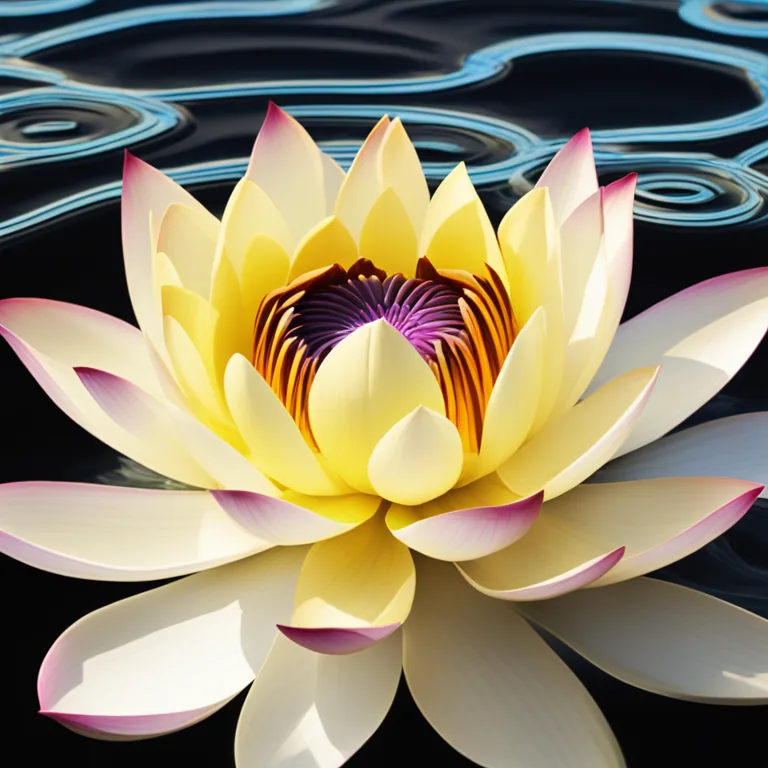
The Essence of Lotus Meditation
Embark on a serene journey with lotus meditation techniques to cultivate peace, balance, and self-awareness.
article by Hina Kurosawa
Introduction to Lotus Meditation
In the realm of mindfulness and spiritual connectivity, lotus meditation stands as a beacon for serenity and enlightenment. Rooted in ancient traditions yet timeless in its benefits, lotus meditation utilizes the symbolic essence of the lotus flower, emblematic of purity and spiritual awakening. As we embrace the contemporary rise of meditative practices, incorporating this age-old technique fosters a harmonious blend of physical stability and mental clarity. This article delves into the profound world of lotus meditation, presenting methods that resonate with practitioners in 2024 and beyond.

The Lotus Posture Explained
Central to the practice is the iconic lotus posture or 'Padmasana'. The intertwining of feet and legs, mirroring the intricate petals of the lotus, sets the foundation for meditative exploration. As you position yourself, the lotus posture facilitates a deepened sense of grounding and symmetry, essential for the flow of energy, or 'prana', through the body's meridians. Cultivating this stable base ensures that distractions wane, allowing for a more profound meditative journey, even amid our fast-paced modern lifestyle.

Engaging the Breath
Breathwork is the life force that propels lotus meditation into a transformative experience. Techniques such as 'Pranayama' guide the practitioner to regulate and deepen their breathing, encouraging a rhythmical flow akin to gentle waves. By observing and modulating each inhalation and exhalation, one engages in a silent dialogue with the self, fostering tranquility and an inward focus. The subtle yet powerful act of mindful breathing serves as a gateway to inner stillness in this contemplative practice.

Visualizing Inner Peace
Visualization amplifies the impact of lotus meditation, integrating imagination with intention. Envisioning the heart or mind blossoming like a lotus in the process of meditation is an enlightening experience. This symbolic growth mirrors personal development, representing the unfolding layers of the subconscious. As the lotus reaches toward the light from murky waters, so does the meditator aspire to higher levels of consciousness, guided by this purposeful imagery.

Chanting and Mantras
The sonic landscape of lotus meditation is enriched by the inclusion of mantras and chants. These sacred sounds provide an auditory anchor for the mind, often inducing a meditative state that transcends common barriers of thought. The resonance of 'Om', a universal mantra, symbolizes the universe's infinite expansiveness. Chants can be silent or vocal, each carrying the potential to weave a meditative spell for the practitioner's benefit.
Meditation in Motion
While the classic practice involves stillness, the evolving nature of lotus meditation has given rise to dynamic forms, blending movement with meditative focus. Techniques such as 'lotus walk' enliven the practice, integrating mindful steps with the grace of the lotus in bloom. This contemporary twist caters to those seeking a more kinetic form of meditation, aligning movement with spiritual mindfulness.
Lotus Meditation in Daily Life
Lotus meditation is a versatile practice that can be woven into the fabric of daily life. Short sessions infused throughout one's day can offer pockets of peace amid chaos, proving that even brief encounters with meditation can yield significant benefits. By consistently nurturing the connection to lotus meditation, practitioners can expect an enhanced quality of life, marked by greater emotional equilibrium and mental lucidity.
Published: 12/20/2023
Modified: 12/20/2023
More predictions
Come back here soon to learn more about yourself and your future


Meditation: Zen Techniques Simplified
Discover the serene practice of Zen meditation with easy-to-follow techniques for a more focused and balanced life.


Meditation for Stress Relief
Discover effective meditation techniques to alleviate stress and enhance mental well-being.


Drift to Sleep with Guided Meditation
Discover meditation techniques that help promote restful sleep through relaxation and mindfulness.